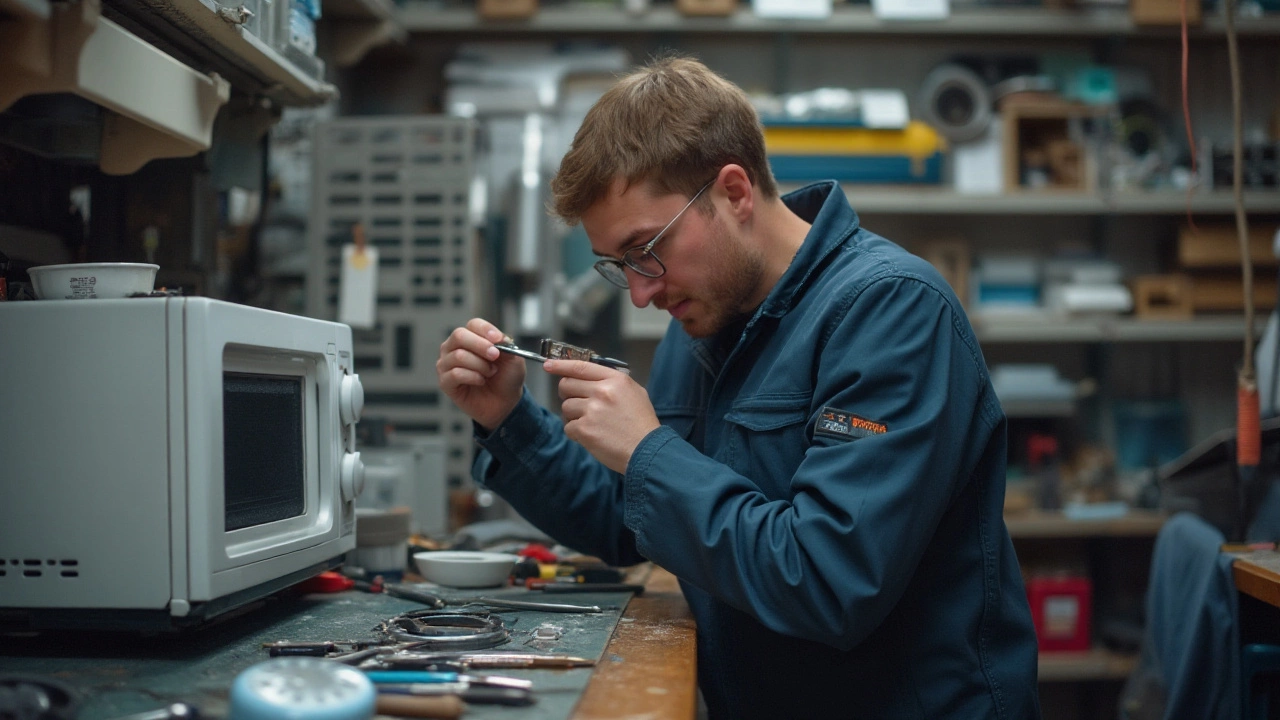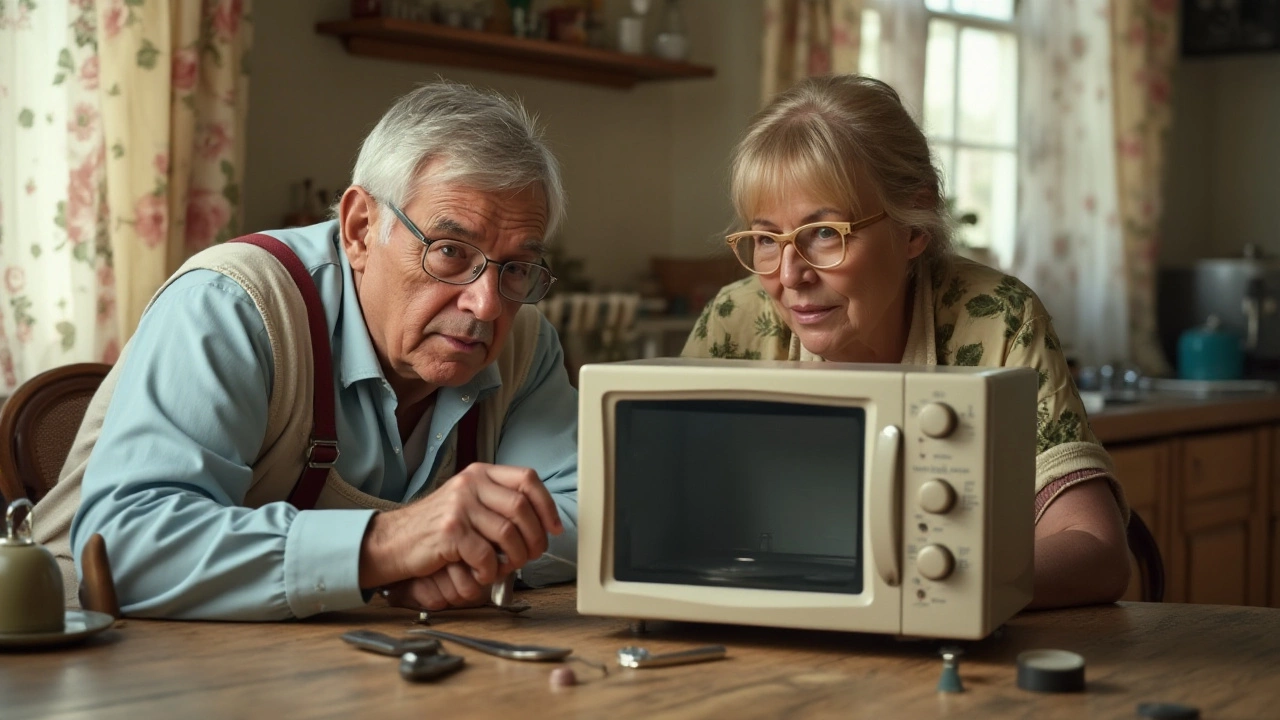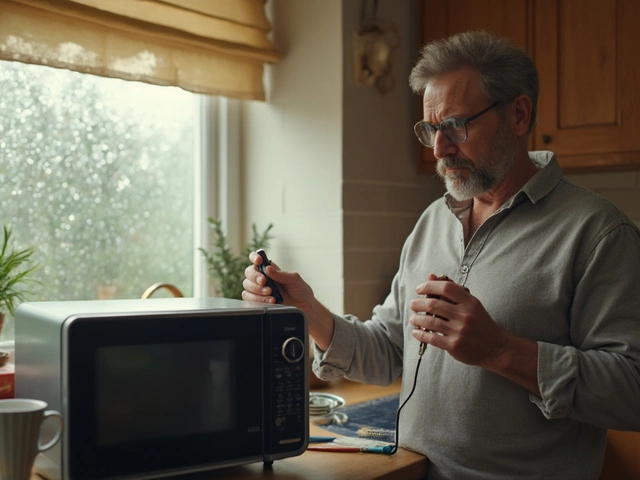Microwaves have long been trusted allies in our kitchens, offering convenience at the push of a button. However, like any other home appliance, they can break down. When faced with a malfunctioning microwave, many of us wonder if repair is the right move or if it's time to splash out on a shiny new model.
Repairing a microwave can be a tricky decision. It involves weighing the cost of repair against the price of a new one, considering how old it is, and understanding the type of problem at hand. Some issues are easy fixes, while others might be a sign that the microwave is nearing the end of its life.
This article will help you navigate through the various facets of microwave repair. From common hiccups to look out for, to analyzing costs, and even simple fixes you can do at home. We'll also delve into those instances when calling in a professional might be your best bet. And, ultimately, assist you in deciding whether your trusty appliance is worth repairing or if a new purchase is on the horizon.
- Common Microwave Issues
- Cost Analysis of Repairs
- DIY Fixes and Safety Measures
- When to Call a Professional
- Making the Buy-or-Repair Decision
Common Microwave Issues
Microwaves are incredibly handy and have become an integral part of modern kitchens. But, like any appliance, they can encounter a variety of issues. One of the most irritating problems is when the microwave doesn't heat. This can be particularly concerning when you're rushing to prepare meals. The culprit could be as simple as a blown fuse or as complex as a faulty magnetron, which is a big deal since it's the part responsible for generating the microwaves that cook your food. Regular inspection of fuses and ensuring the power connections are secure can sometimes offer a temporary fix. However, if the microwave repair involves the magnetron, professional assistance might be needed.
Another common issue is the microwave making strange noises during operation. It's never a good sign when your appliance makes an unfamiliar whirring, buzzing, or clanking. These noises often arise from a malfunctioning drive motor or a deteriorating turntable guide. If the noise becomes unbearable, investigating the turntable and related components can give you an idea of what might be going wrong. Examining the noise can give clues—sometimes the sounds are due to objects inside touching the microwave walls or because of leftover food debris causing the turntable to misbehave. A simple cleaning spree might quiet things down.
While we all enjoy well-lit kitchen appliances, a microwave's interior light unresponsiveness may leave some users in the dark quite literally. Often, this is just a case of a blown bulb—a quick fix for most. Still, it can also indicate electrical issues. Ensuring the problem isn't deeper than a bulb issue is essential. It's usually straightforward, but while tackling fix microwave tasks like these, ensuring that the appliance is unplugged is not only sensible; it's a must for safety.
"The microwave is a testament to human ingenuity. When it works, we tend to forget about its intricacies. But when something goes awry, even the smallest defect can become a significant inconvenience." —TechKnow Magazine
Finally, a microwave with door latching issues can be a nuisance. If the door doesn't close properly, the microwave won't operate at all. This can be a simple alignment fix, or it might involve adjusting the door latch assembly. A poor latch can also expose users to leakage of harmful waves, so this isn't something to take lightly. Immediate attention and thorough checking are of utmost importance.
Understanding these common issues not only prepares you for appliance maintenance but also enables you to handle some problems without resorting to external help. However, always remember to prioritize safety when dealing with electrical components.
Cost Analysis of Repairs
When faced with a malfunctioning microwave, the thought of repairing it often pushes us to ponder the real cost of doing so. It's not just about the immediate expense of fixing the issue, but also about weighing this against investing in a new appliance. For many, the allure of shiny new gadgets is strong, yet understanding the potential value in repair is essential for making a smart financial decision. Typically, the cost of repairing a microwave can range from as low as $50 to several hundred dollars, depending largely on the type of repair needed and the model in question.
Microwave repair costs often fall within several common categories. Replacing a magnetron, likely the most expensive part of a microwave, can set you back quite a bit, sometimes around $100 or more, including labor fees. Meanwhile, simpler fixes, such as replacing a diode or a door latch, often stay under the $80 mark. But let’s not forget the hidden cost of labor, which can differ greatly depending on where you are. Often, service fees are charged simply for the technician's time to diagnose the issue, regardless of repair. This fee might be absorbed into the cost of the repair if you choose to move forward, but it’s wise to ask beforehand to avoid any surprises.
"Many consumers upgrade their microwaves far too early," suggests Janet Gonzalez, an appliance expert at Home Tech Monthly. "Understanding what repairs cost can save not just money, but also prevent unnecessary waste."Knowing whether to repair an appliance will also depend on its age. A good rule of thumb often cited is the 50% rule: if a repair costs more than half of what you paid for the microwave, and the appliance is more than halfway through its expected life span (six to ten years), then it might be more cost-effective to consider buying a new one.
Looking at a real-world context, consider energy efficiency. Older microwaves tend to consume more electricity compared to new, energy-efficient models. This means your decision might extend beyond just repair costs, taking into light your monthly utility bills. Whether it's worth fixing or buying new should take all these financial nuances into account. Certainly, using a bit of number-crunching over a good old cup of joe could pave the way to a decision that keeps both the wallet and the conscience light. Along the process, weigh the pros and cons of each path, but rest assured, each decision represents an opportunity to learn just a little bit more about your trusty kitchen companion.

DIY Fixes and Safety Measures
Tackling microwave repairs on your own can be incredibly satisfying and might even save you money, but it's important to take the right precautions to avoid any mishaps. When a microwave acts up, the problem might not be as daunting as it seems at first. Issues like a blown fuse or a malfunctioning door latch can often be handled with basic tools and a little patience. Before diving into any repairs, it's imperative to always unplug the appliance to avoid accidental electric shock. Safety should always be your priority, so take your time to carefully assess the situation.
One common problem involves the microwave not turning on, which could be traced back to a tripped switch or a blown fuse. Once you have discharged the capacitors, you can replace the fuse by locating the fuse box and gently switching out the faulty component. Some people have encountered microwave doors that won't properly close, leading to operational failures. In this case, checking for debris or misalignment in the door latch can reveal easy fixes. Problems with the turntable not spinning might stem from grime build-up or a worn-out roller guide, which can often be resolved with thorough cleaning or part replacement.
Another handy fix is addressing odd noises, which might originate from a damaged stirrer or motor. In this instance, listening closely will help narrow down the source. Regular maintenance goes a long way against such issues, so cleaning your oven visibly and checking its components each month can prevent unnecessary problems. However, not all troubles are simple to tackle; if you encounter a persistent sparking within the oven, it's best to consult a professional to prevent further damage or potential fire hazards.
Before embarking on any DIY fixes, it's crucial to arm yourself with accurate information and guidelines. As veteran appliance technician, John Smith advised,
"being prepared and understanding your appliance is the best defense against unexpected breakdowns."He stresses the importance of consulting the model-specific manual for each situation, as following manufacturer instructions ensures the highest likelihood of success. Don't hesitate to explore video guides tailored to your specific microwave brand — they can illuminate tricky spots with visual clarity. Always remember, a successful repair doesn't just bring your appliance back to life; it provides you with confidence and valuable insight for future endeavors.
When to Call a Professional
When it comes to dealing with a broken microwave, knowing when to call a professional can save not only time but possibly ensure safety as well. While some common microwave problems can be easily addressed with a DIY approach, others warrant the skills and expertise of a qualified technician. An important factor is the complexity of the issue. For instance, problems with the internal circuitry, such as the magnetron—a vital component that generates the microwaves—require technical know-how. Attempting to repair these without proper training could lead to electrical hazards.
For those curious about tackling the repair themselves, safety should always come first. Additionally, certain signs indicate a problem that's beyond casual fixes. These include sparks appearing inside the microwave, unusual noises like loud humming or buzzing, or even the machine turning on but not heating food. Under these circumstances, the most prudent step is often to seek professional help. Given the potential risks associated with trying to fix electrical appliances like microwaves, these professionals are skilled at diagnosing and mitigating such issues safely.
Another crucial aspect to consider is the age of your appliance. If your microwave is relatively new and still under warranty, turning to a professional is typically the best route. Repairs done by certified technicians ensure compliance with warranty terms and prevent voiding it. A 2019 report by Consumer Reports highlighted that the median lifespan of a microwave is roughly nine years. So, if your appliance is younger than this, professional repair might still be a viable, cost-effective option.
According to Lisa Lee Freeman, a consumer advocate, "Knowing when to fix or replace your microwave not only impacts your budget but also supports sustainability."
Imagine you're unsure if the issues you're facing stem from the control panel or the door latch. Misidentifying these might lead to unnecessary problems, escalating both time and effort. A certified technician has the tools and expertise to accurately pinpoint the problem and provide a reliable fix. In rare cases, problems stem from the power source or require a detailed internal inspection, something only a seasoned professional is equipped to handle.
Let's not forget the element of convenience. While many choose the DIY route to save costs, the peace of mind from a professionally repaired microwave often outweighs the initial service fee. Moreover, many repair services offer guarantees on their work, providing additional security for homeowners worried about recurring troubles. As with any service, it's important to choose a reputable professional known for honesty and quality work.
For those juggling busy lives, the idea of diagnosing and repairing an appliance like this might not be feasible. It’s at this crossroad that professional repair services truly shine, allowing you to focus on other responsibilities while knowing your appliance is in capable, expert hands. It’s a worthy consideration, especially when your appliance maintenance means more time enjoying your meals and less worrying about repairs.

Making the Buy-or-Repair Decision
Deciding whether to repair or replace your microwave can feel like a daunting task, especially when you consider how integral this appliance is to daily life. It often comes down to several key factors: the cost of repair, the age and condition of the microwave, and personal preferences regarding features and energy efficiency. Some people might find themselves attached to their microwaves, especially if it has served them well for many years. Such sentiments can make the decision harder, as you weigh nostalgia against practicality.
One way to approach this decision is by evaluating the specific issue your microwave is facing. For example, if it has stopped heating altogether, this might suggest a major component failure like the magnetron, which can be expensive to replace. For an appliance that’s already had a decade of use, investing in such a costly repair might not be wise. On the other hand, if you're just dealing with a faulty switch or a broken turntable motor, these are generally more affordable repairs. Always consider reaching out to professional repair services to get a quote; sometimes knowing the potential cost ahead can provide some clarity.
Age is another crucial factor in the decision-making process. Modern microwaves have an average lifespan of about 9 to 10 years. If your microwave is around or past this age, it might be more practical to shop for a new one. Modern models often boast energy efficiency and safety features that older models might lack, making them more appealing not just from a features standpoint but also in their potential savings over time. To bring this into perspective, a microwave that helps lower electricity bills with better energy efficiency can sweeten the deal of a new purchase.
For those who enjoy weighing financial considerations, creating a simple cost-benefit analysis can be enlightening. List down the repair costs and compare them to the price of a new microwave, considering also the occasional sale or discount you might find. According to Consumer Reports, if the repair costs are more than half the price of a new microwave, it's generally advisable to go with the replacement option. On the flip side, if repairs are less expensive, you might prolong your microwave's life for a fraction of the cost.
Beyond numbers, there's personal preference and the emotional aspect to consider too. Some individuals might value the idea of having new features, such as smart connectivity or advanced cooking sensors, which can make daily tasks easier. Others might appreciate the simplicity of an older model that has fewer parts to malfunction. Here, asking yourself which features you truly value can guide you towards the right choice. A new microwave might offer more conveniences that align with your current lifestyle, whereas an older model could hold nostalgic value and uniqueness that newer ones don't provide.
Let us not forget the environmental aspect of this decision. Repairing a microwave can be seen as an eco-friendly choice by prolonging its lifespan and minimizing electronic waste. However, modern models tend to be more energy-efficient, which can make them a sustainable choice in the long run. As summarized by an expert from the Environmental Protection Agency, "Extending the life of your appliances through repair can lessen the environmental impact, but so can investing in energy-efficient models."
To sum it up, deciding whether to repair or replace your microwave involves a careful balance of cost, practicality, eco-consciousness, and personal preference. By considering each of these factors, you can make a decision that best suits your circumstances and needs. So, next time your microwave starts making a strange noise or refuses to heat your leftovers, you'll be better prepared to make the choice between hellos and goodbyes.





